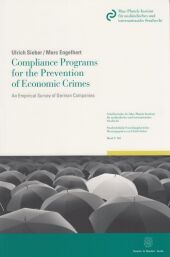 Neuerscheinungen 2014Stand: 2020-02-01 |
Schnellsuche
ISBN/Stichwort/Autor
|
Herderstraße 10
10625 Berlin
Tel.: 030 315 714 16
Fax 030 315 714 14
info@buchspektrum.de |

Marc Engelhart, Ulrich Sieber
(Beteiligte)
Compliance Programs for the Prevention of Economic Crimes
An Empirical Survey of German Companies
2014. XXI, 312 p. w. figs. and tables. 224 mm
Verlag/Jahr: DUNCKER & HUMBLOT 2014
ISBN: 3-428-14458-9 (3428144589)
Neue ISBN: 978-3-428-14458-7 (9783428144587)
Preis und Lieferzeit: Bitte klicken
Changes in today´s global risk and information society create new challenges for criminal law and criminal policy. These changes have pushed traditional criminal law to its territorial and functional limits and require alternative forms of social control. The present book is the first publication that, on the basis of a broad, scientifically based empirical study not only analyzes the existence, content, and effectiveness of German compliance programs but also addresses the effectiveness of various strategies in preventing crime and fostering the implementation of compliance programs.
Changes in today´s global risk and information society create new challenges for criminal law and criminal policy, particularly with respect to complex crimes such as white-collar crime, organized crime, and terrorism. These changes have pushed traditional criminal law to its territorial and functional limits and require alternative forms of social control. This can be seen especially with respect to the global threats to economic markets caused by new forms of corporate crime in the 21st century. In this field States are increasingly compensating their loss of control in the prevention and prosecution of crime by requiring private persons and companies to cooperate in crime prevention, especially through the use of compliance measures as a form of "regulated selfregulation". The current draft of a new law on corporate criminal liability in Germany takes this approach. Until now, however, progress in this area has been impeded by a lack of sound empirical data.
The present book fills this gap. It is the first publication that, on the basis of a broad, scientifically based empirical study, not only analyzes the existence, content, and effectiveness of German compliance programs but also addresses the effectiveness of various strategies in preventing crime and fostering the implementation of compliance programs.
1. Introduction
Object of Present Study - Current State of Research - Aims and Methods of Present Study
2. Content and General Evaluation of Compliance Programs
Content of Compliance Programs - Evaluation of Compliance Measures - Interviewed Companies and Interviewees
3. Special Comparative Evaluation of Different Regulative Approaches
Evaluation of Strategies for the Prevention of Crime - Evaluation of Strategies for Creating Compliance Programs - Interviewed Companies and Interviewees
4. Results of Compliance Documents published by DAX 30 Companies
Compliance and Online Presentation - Legal Topics Covered - Ethical Topics Covered - Information and Reporting Structures - Compliance Instruction
5. Summary and Conclusions
Object, Aim, and Methodology of the Present Study - Empirical Results on the Status of Compliance Programs in Germany - Consequences and Hypotheses for Criminal Policy - Summing Up: Hypotheses in Short
Annex: Questionnaires and Tables T-Test
Bibliography


